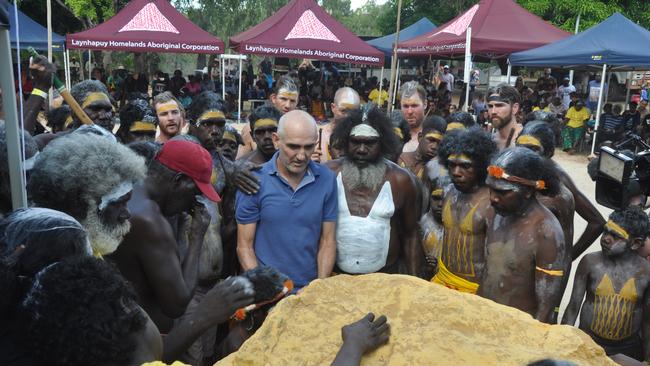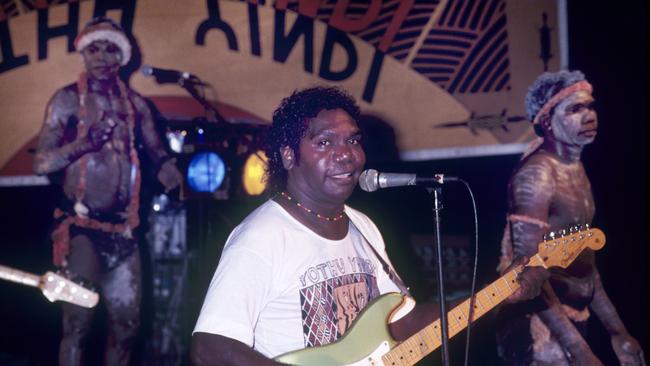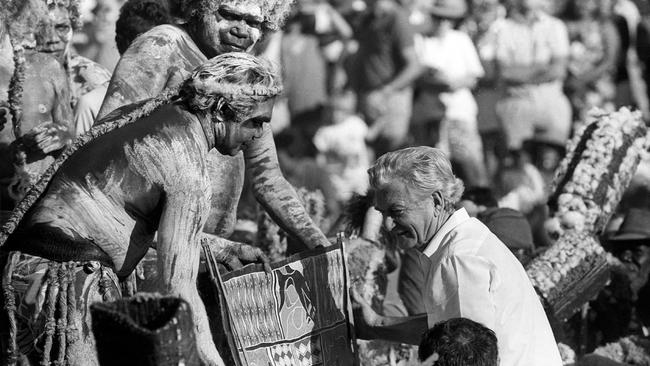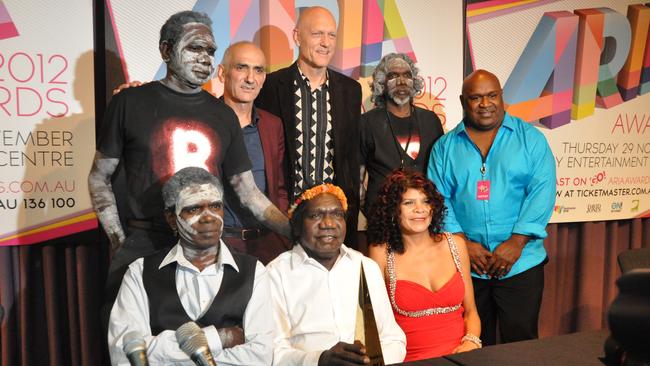Treaty, yeah! The making of an anthem
The hit song Treaty lit a fire around the nation. Thirty years on, key collaborators remember those heady days of hope.

On a lonely patch of the northern Australian coastline, a sweet, sad ceremony is underway. It’s June 7, 2018. The smell of burnt eucalyptus and the smoke of a slow-roasting barbecue carry on the dry season breeze. A makeshift stage has been trucked into the remote Gumatj homeland, 130km down a potholed dirt highway from the nearest township of Nhulunbuy, on which a sweaty crew tune guitars and test amps beneath the brutal glare of the East Arnhem Land sun. A posse of scrappy camp dogs watch as guests climb out of their packed 4WDs and filter into the site. A soundie sorts the speakers and a distinctive guitar groove blasts out. The vocals carry over the grounds:
Well I heard it on the radio,
And I saw it on the television…
It was out here at Biranybirany, between beers and by the flames of an open campfire, that the first snatches of the Yothu Yindi song Treaty were hashed out in 1990. A spark lit that would eventually spread into a wildfire. The early embers of a game-changing political anthem, with a chorus that was never meant to make it out of the rehearsal room. An ARIA Song of the Year and its video clip – remember those kids backflipping on the beach? – that opened the eyes of a generation. The Biranybirany speakers blare:
Treaty yeah! Treaty now!
A couple of the (eight!) credited songwriters on Treaty are reunited here for this sombre occasion. Its lead author is physically absent, gone from this world, but his spirit blazes strong in the hearts of those congregated. On this morning, they’re here for him: it’s a memorial, out at the birthplace of his biggest hit, to mark five years since he passed away. The guests shuffle in, sitting to await the day’s proceedings. Among them is a famous musician, standing with his hands behind his back like a polite schoolboy.
Suddenly, the dull murmur of the crowd is broken by the reverberating clack of two pieces of wood being knocked together in a driving beat – tock tock tock – and the purposeful holler of a sort-of marching band leader revving up a procession. This leader is Witiyana Marika, the charismatic co-founder of Yothu Yindi. He’s at the head of about 30 painted warriors, both Yolngu and balanda (non-Indigenous), black and white, all men. Bilma (clapsticks) clasped in his hands, Witiyana cracks them together in time, an ancient metronome ringing out. He steers the troupe towards the large sandpit that’s been deposited in front of the stage, at the heart of this open bush auditorium.
The famous musician in the audience is suddenly summoned by Witiyana. “Paul Kelly!” shouts the Yothu Yindi songman. “Yow, Paul Kelly!” Witiyana guides him into the procession that’s headed towards a large boulder draped in yellow fabric by the stage. He instructs Kelly with earnest glances and hand signals. His chants hit an urgent climax as he takes Kelly’s arm and guides it onto the boulder, to the sheet of yellow fabric. Kelly has evidently grasped his role and stretches out his hand to remove the sheet. For a second, his otherwise passive face is marked by sorrow.
On the stone lies a plaque bearing the words:
My tongue is the flame, gathered, prepared
and alight.
It burns with truth carrying me across the land of my backbone.
Dr Mandawuy Bakamana Djambayang
Djarrtundjun Yunupingu AC,
September 17, 1956 – June 2, 2013.

A photograph sits at the plaque’s centre – a wide smiling face rounded by black curls, a face once recognised across the nation. It’s Mandawuy Yunupingu. Gumatj songman, school principal. The charming Yothu Yindi band leader who burst from the NT wilderness to become one of the most famous Aboriginal men in the country.
Paul Kelly wipes a speck from his eye and Witiyana grasps him around the shoulder in solidarity as the warriors stand gazing at the plaque, heads bowed. Then, in a sudden flurry, like a tide returning out to sea after the crash of a towering wave, they grab a seat in the sand, awaiting the next part of proceedings. The musicians make their way up to the stage.
Well I heard it on the radio
And I saw it on the television
Back in 1988
All those talking politicians…

Leaning against the trunk of a paperbark tree, Mandawuy Yunupingu slapped at the box of an aged acoustic guitar. An idea was bouncing around his mainframe. He’d been thinking about a broken promise. Two years on from Prime Minister Bob Hawke’s 1988 pledge to forge a treaty with Aboriginal people, it remained unfulfilled. Yothu Yindi’s lead singer wanted to write a song to let Australia know: they weren’t gonna let this one drop. But there were also mudcrabs to be roasted and shellfish to be shucked, beers to be poured and guitars to be played. It was 1990 and Yothu Yindi had gathered out at Biranybirany to fine-tune some of the titles for their second album, Tribal Voice. Mandawuy had invited his fellow musos out for a week in the scrub: Witiyana Marika, Milkayngu “Milkay” Mununggurr, his nephew Gurrumul Yunupingu and Stu Kellaway, plus an assortment of percussionists, random players and relatives.
Another newcomer had also arrived on the scene at Biranybirany, one who would have a profound impact on the tune Mandawuy was tinkering with. While crisscrossing the US in 1988, Paul Kelly and his band The Coloured Girls (called The Messengers in the US) had bumped into Yothu Yindi at a gig in Chicago where they were performing as the support act for Midnight Oil. He reflects on this meeting from Queensland, where he’s holed up waiting for his own band to be freed from Melbourne’s coronavirus lockdown, recalling how he headed backstage after the gig and had his first ever conversation with Mandawuy.
“I had a song called Under the Sun, and there’s a line in it that mentions ‘the honey sun’,” Kelly says. “And he said, ‘Honey sun! That’s my Dreaming.’ That was within the first minute of meeting me. It didn’t strike me until later that, ‘Oh, he’s just found this connection between us! A connection between our cultures; between my work, his Dreaming, just like that.’ I guess that symbolises him for me. He was someone who made those connections, someone who balanced two worlds.”
From this early introduction in the US, a friendship grew between the two men that led to Kelly working with the band in Mandawuy’s sacred Gumatj homeland. “I remember very vividly walking along the shores of Biranybirany, and [Mandawuy] spearing fish that I couldn’t see,” he chuckles. “Being with someone who was so attuned to their country that they’re reading it just like a book, whereas I’m stumbling around blind…”
Kelly had hauled a fellow Melbourne-based musician up for the sessions, a renowned percussionist named Ray Pereira. “My brief was to come up and work with a young Gurrumul… and show Gurrumul some conga rhythms,” says Sri Lanka-born Pereira. His beats proved influential in helping Yothu Yindi tighten their material, but one song wasn’t quite there yet.
Mandawuy was still thinking about Hawke’s promise. The treaty. He’d been wanting to write a song to express his disappointment, his frustration at the failures of southern bureaucracy for never having properly acknowledged his people. Kelly says the singer’s vision was clear. “He wanted to write a song about the treaty, and he wanted to write it with a balanda, because he thought it would have more power coming from both cultures,” explains Kelly. “He wanted to keep that idea and that flame alive.”
The musicians moved to Darwin to continue their efforts on the album in a rehearsal studio. One morning Kelly was plucking at the still-unfinished Treaty, when, Pereira says, he came up with the now famous opening line:
Well I heard it on the radio...
“He was mucking around with that ... and he says to me, ‘What do you think of this?’ and I said, ‘Hmm, not sure, Paul... you’re Paul Kelly! Surely you can come up with something better than that,’” Pereira laughs. “It just didn’t sound right to me at the time... but he just kept working on that, and he laughed and I laughed, of course I wasn’t serious about it, because I know he’s an incredible lyricist. But I feel privileged to have probably been the first one to hear that line.”
In the rehearsal room, Treaty remained on the back burner. “We worked mainly on all the other songs,” Kelly says. “And on the last day, we were having a break, and the band came back from the break and started jamming on one chord – E minor. They started a funky jam. And I started singing the words we had over the top, and we added another chord, then the manikay [song/songline], and suddenly we realised we had something.” This motley crew of Yolngu and balanda blokes had enough notes to holler along to a basic riff, with a stopgap chorus that they’d invented in the studio:
Treaty yeah! Treaty now!
The band’s bassist remembers feeling something akin to a revelation. “We went, ‘Wow!’ and we workshopped it more and we put the yidaki [didgeridoo] in the middle of the groove,” says Stu Kellaway. “And we went, ‘F..k, this is powerful! This is killer.’” It was raggedy, a bit rough. But it was a start. “We didn’t really have a chorus so we just sang, ‘Treaty yeah, treaty now!’ and we thought, ‘We’ll write a proper chorus later,’” says Kelly.
Not long afterwards, during a show at Darwin’s Amphitheatre, Mandawuy decided to chuck the unfinished song into the setlist. ‘‘It became a song, right there,” says Witiyana Marika. “And we said, ‘One day we’ll be powerful, and through this song we’ll tour the world and share that message.’”

But it wasn’t done yet. The Tribal Voice album was a patchwork being stitched together with parts from all over: songwriting sessions and shows in Arnhem Land, Darwin and Sydney. The band had hand-picked a producer named Mark Moffatt, who had produced (I’m) Stranded, the formative single of Brisbane punk pioneers The Saints, and Goanna frontman Shane Howard’s solo record River. Some well-known musicians were called in to add backing vocals for Treaty, including Archie Roach, Tim Finn, and Rose Bygrave from Goanna. The sessions were solid progress, but the band and their producer were well aware that Treaty still wasn’t quite finished.
Back at his base in Melbourne, Paul Kelly picked up the phone to Alan James. In Kelly’s memory, the conversation with the bewildered Yothu Yindi manager went as such: James: “The band have recorded Treaty. Mushroom want it to be the single. But the thing is, I can’t understand what [Mandawuy is] singing!” Kelly: “Oh well, I don’t think we’ve finished the words yet, so maybe he’s sort of just mumbling something?”
James: [pause] “Can you get up to Sydney?”
Kelly reunited with Mandawuy at Yothu Yindi’s rental place in Glebe to thrash out the final lines. “I remember going to the hotel and sitting around with brother and writing the rest of the lyrics,” says Kelly. “Because they had a recording session booked the next day, we finished the lyrics pretty quick – nothing like a deadline.” Before they signed off on it, Mandawuy sought Midnight Oil frontman Peter Garrett’s input. “The Midnight Oil offices were not far away. We went there with a guitar, we sat down and played the song to Peter, just to sort of get what I jokingly call ‘the royal nod’,” laughs Kelly.
Garrett looks back on this time. “Essentially the song was pretty much done,” he says. “Manda and Paul Kelly had written it, so the architecture of the song was pretty much there.” The trio talked through the track and Garrett made a couple of suggestions for linking lines. In Midnight Oil’s office, the blank bridge section was finally realised as a rising refrain: Promises disappear! Priceless land! Destiny! Garrett had sorted out the final piece of this pop music puzzle. “I thought the song had a lot of potential, and I thought it was a really strong song, and I thought once we’d finished with it, it was even stronger. And if you like, that’s partly what I saw my role to be. Just to sort of get the rivets in place and strengthen it up as it went through.”
With a meritorious single featuring two of the nation’s most prominent songwriters, the band took stock of what they had up their sleeve. They’d all worked on it, so band democracy came to the fore. The songwriting credits for Treaty feature not just Mandawuy, Kelly and Garrett, but five other members of the Yothu Yindi family: Gurrumul, Witiyana, Milkay, Stu Kellaway and Cal Williams. These extensive credits show the optimism around this release, if only for the hope of a few bucks to filter through in songwriting royalties.
Witiyana says he felt something in the air after Treaty was recorded. “We knew it was going to be a hit song for Australia, for Arnhem Land,” he says. “We knew. Manda reckoned it could be a best version of Yolngu-balanda mix, contemporary and traditional. When I saw the kids were dancing, it was something. A new revolution had come. An era. It was something really powerful. The lyrics hit people and made them get up and dance right across [the nation], which is something beautiful.”
Edited extract from Writing in the Sand by Yothu Yindi’s authorised biographer Matt Garrick (ABC Books, $45), out October 27. Names and images of the deceased have been used with permission from family members.

To join the conversation, please log in. Don't have an account? Register
Join the conversation, you are commenting as Logout